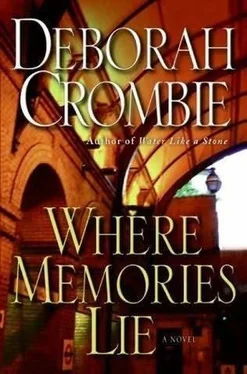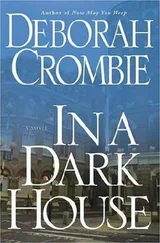"Because of this? Because of David?" For the first time that night he heard distress in her voice.
"No. Or if so, it was just the last little piece."
She nodded slowly. "I know about last little pieces. They are the ones that cause the edifice to topple."
He had stopped noticing her accent until she said a word like edifice, and then it made him want to smile. "Yes."
Erika rose and took his glass. "I will find us something else to drink. Tea, if all else fails. I became very English, during the war."
Finding he couldn't sit, Gavin followed her into the kitchen. Had she meant her husband, when she said she knew about last little pieces? Had her marriage failed before her husband's death?
She stood with her back to him, reaching up into the cupboard for cups and saucers. Gavin felt a return of the light-headedness that had brought him to her door, although surely it couldn't be the sherry.
Erika paused with the cups in midair, as if she sensed his nearness. Then she very carefully lowered the china to the worktop and rested her hands on its edge. She stood so still that she might have been waiting for a clock to tick or the world to turn on its axis.
He cupped his hands round her shoulders and felt the heat from her skin through the thin cotton of her dress. A quiver ran through her body, but she neither turned nor pulled away. "Erika," he whispered, "I shouldn't-your husband-this is wrong-"
In answer, she placed her hands on his and slipped them down until they covered her breasts, and he gasped with a desire so intense it left him shaking.
She said, "My husband never touched me after the night we left Berlin." Then she turned in his arms and tilted her head until she could meet his eyes. "And this-this is whatever we make it, my love."
Even though the Allies were fighting a war against Nazi Germany, whose anti-Semitism was a central plank of its public policy, anti-Semitism did not suddenly disappear from Britain during the war, but persisted and even increased.
– Pamela Shatzkes, Holocaust and Rescue: Impotent or Indifferent? Anglo-Jewry, 1938-1945
Shadow had fallen in the courtyard at St. Barts by the time Gemma reached the main gates. She ducked inside and pulled her mobile from her bag, checking for messages now that she was out of the bright afternoon sun and could actually see the display. Nothing yet from Kincaid, and nothing from her sister. Closing the phone, she glanced up and caught sight of her father emerging from the temporary corridor that led round to the back of the complex.
She had seen him before he saw her, and in that instant took in his slumped shoulders and bleak expression. "Dad," she called out, and hurried towards him. "Is Mum all right?" Glancing at her watch, she added, "I haven't missed visiting-" The words died on her lips. At the sound of her voice, he had looked up, his face hardening, his chin coming up with the familiar bulldog pugnaciousness.
"You've missed seeing her, if that worries you at all," he said as he came up to her. "She's sleeping. It was a bad day, but then you'll know that, won't you? With all the time you've been taking from work to spend with your mum."
"Dad-I was-I am-but-"
"You have something better to do with your time? Is that what you're telling me?"
"No, Dad, of course not. But someone was killed last night-"
"And that's more important than your mother dying?"
Gemma stared at him, feeling as if she'd been punched. "What are you talking about? Mum's not dying. They've said it's treatable-"
"That's doctor talk for when they don't want to tell you the truth. She's bad. I've never seen her like this."
To Gemma's horror, she saw that he was close to tears. "Dad, she's going to be all right." She reached out, touched his arm, but he shook her off.
"Don't you dare talk down to me," he spat at her. "You've no right, missy, and this is one time when you don't know best."
All his criticism, all his disapproval, suddenly seemed more than she could bear. A red wave of fury exploded behind her eyes. "And don't you talk to me like that," she shouted back at him. "What have I ever done to deserve being treated like that?"
Vaguely, she was aware of other people moving past them, of whispered comments, but she was past caring. "I've made something of myself, something that should make you proud. I'm responsible. I've got a good career. A beautiful child. A good relationship. Why can't you for once give me a lit-"
"So that's the way it is, is it?" Having got a rise out of her, he had gone cold. "If your life is so perfect, why don't you marry him and give your mum some peace of mind while you can?"
***
"I still don't like him," said Cullen when he and Kincaid were at last back in the car. "He's very convincing, but he was just as convincing as an arrogant shit at Harrowby's. So how can you be sure which one is the act?"
They had called in a search team for the Khans' house, and a tow for their dark blue Volvo SUV, which turned out to be registered to Sophie Khan. "Ka never drives it, unless we go out together in the evenings or on weekends," she had told them.
When asked to confirm her husband's whereabouts on the two nights in question, she had said that of course he was home in bed, and what sort of idiot did they take her for if they thought she wouldn't have noticed him leaving to go run someone down?
She'd had one child on her hip and the other wrapped round her leg, and had looked fierce enough to rip their entrails out if they threatened her family.
Khan had gone quiet and distant, and Kincaid couldn't read behind the mask. Having told them quite civilly, once he'd calmed down, that they were wasting his time and theirs, Khan had added that any documents he had copied from Harrowby's he had passed on to his journalist colleague, and that he would not give his friend permission to release them.
"And if you think I'm a hard case," he'd added with a faint smile, "you haven't met Jon. You'll not get a scrap of paper from him with anything less than a subpoena."
"Should we tackle the journalist?" Cullen asked now with what sounded like relish.
Kincaid considered, then said, "Not until we've had another word with the slippery Giles Oliver."
***
Gemma watched her father walk away, her anger ebbing as quickly as it had come. She wondered if she would ever learn not to bite, not to try for the last word, because it was inevitably a losing battle. All she had done was prove that he still had the capacity to hurt her, and to make her doubt herself.
But what he had said-was he right about her mum? She turned and started down the long tunnel of the makeshift corridor, her heart pounding as if she'd just run a sprint. When she reached her mother's ward, she stood at the desk, swallowing against the dryness in her mouth as she waited for the charge nurse to be free.
It was the same Pakistani man she had spoken to the first night her mum had come in, and he smiled in recognition as he handed off a chart to another nurse and turned to her.
"You can go in," he said. "She's resting, but-"
"Is she worse?" Gemma asked. "My dad said she was"-she couldn't bring herself to say the word-"that she was having a bad day."
"Oh, I wouldn't go that far." The nurse shook his head. "She's just tired from the chemo, and the antinausea medication makes her a bit sleepy. She's doing just fine. You go in and see for yourself." He waved her off, turning to someone else, and she had no choice but to follow his command, even though her heart was still skipping erratically.
Читать дальше












